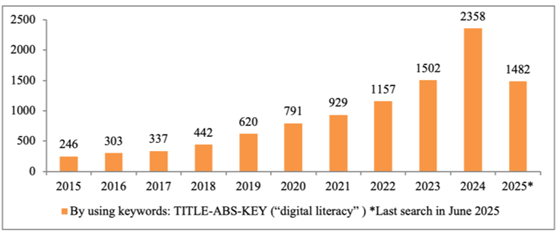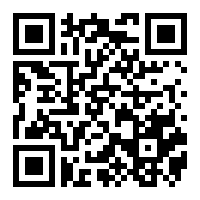Research Trends on the Implementation of Digital Literacy in Education: A Bibliometric Analysis of the Scopus Database
DOI:
https://doi.org/10.23917/ijolae.v7i3.11087Keywords:
21st century skills, collaborative learning, critical thinking skills, digital literacy, digital technologies in education, remote learning, pedagogical innovation, research evolutionAbstract
This study examines publication trends and research developments in the field of digital literacy in education using bibliometric analysis. A total of 389 documents were retrieved from the Scopus database (2005 to mid-2025) using the keyword Digital Literacy and related educational terms. The PRISMA method was applied to ensure data validity and relevance. The analysis shows a significant increase in publications starting in 2013, peaking in 2023. Universitas Negeri Yogyakarta was identified as the most productive institution, while Indonesia led in publication volume (n=54), although its international collaboration rate remained low (12.85%). Authors from the United States and Indonesia contributed most frequently. The journal “Education and Information Technologies” was found to be the most productive. The most cited articles focused on informal learning, digital generations, and non-formal educational settings. Thematic evolution revealed conceptual deepening and the emergence of multidimensional approaches to digital literacy. Eight keyword clusters were identified, with new topics such as “Artificial Intelligence”, “Self-efficacy”, “Augmented Reality”, and “Inclusive Education” highlighting future research directions. These findings indicate that digital literacy in education now spans technical, pedagogical, affective, and social dimensions. However, this study is limited to the Scopus database and only includes data up to mid-2025. Future research is encouraged to explore digital literacy in specific educational settings such as vocational, out-of-school, and hybrid learning. Additional gaps include teacher competence in AI integration, challenges in inclusive digital learning, and the need for locally relevant digital literacy indicators.
Downloads
References
Abedi, E. A. (2024). Tensions between technology integration practices of teachers and ICT in education policy expectations: implications for change in teacher knowledge, beliefs and teaching practices. Journal of Computers in Education, 11(4), 1215–1234. https://doi.org/10.1007/s40692-023-00296-6
Agrawal, S., Oza, P., Kakkar, R., Tanwar, S., Jetani, V., Undhad, J., & Singh, A. (2024). Analysis and recommendation system-based on PRISMA checklist to write systematic review. Assessing Writing, 61, 100866. https://doi.org/https://doi.org/10.1016/j.asw.2024.100866
Ammar, M., Al-Thani, N. J., & Ahmad, Z. (2024). Role of pedagogical approaches in fostering innovation among K-12 students in STEM education. Social Sciences & Humanities Open, 9, 100839. https://doi.org/https://doi.org/10.1016/j.ssaho.2024.100839
Anurogo, D., La Ramba, H., Putri, N. D., & Putri, U. M. P. (2023). Digital Literacy 5.0 to enhance multicultural education. Multicultural Islamic Education Review, 1(2), 109-179.
Aydınlar, A., Mavi, A., Kütükçü, E., Kırımlı, E. E., Alış, D., Akın, A., & Altıntaş, L. (2024). Awareness and level of digital literacy among students receiving health-based education. BMC Medical Education, 24(1), 38. https://doi.org/10.1186/s12909-024-05025-w
Butar, S. B., Haniva, R., & Mulyadi, H. (2024). Research trends in teacher digital competencies: A bibliometric review. Jurnal Varidika, 31-49.
Carabregu-Vokshi, M., Ogruk-Maz, G., Yildirim, S., Dedaj, B., & Zeqiri, A. (2024). 21st century digital skills of higher education students during Covid-19—is it possible to enhance digital skills of higher education students through E-Learning? Education and Information Technologies, 29(1), 103–137. https://doi.org/10.1007/s10639-023-12232-3
Chang, C.-Y., Kuo, H.-C., & Du, Z. (2023). The role of digital literacy in augmented, virtual, and mixed reality in popular science education: a review study and an educational framework development. Virtual Reality, 27(3), 2461–2479. https://doi.org/10.1007/s10055-023-00817-9
Chen, Haojing, Tsang, YP, & Wu, CH. (2023). When text mining meets science mapping in the bibliometric analysis: A review and future opportunities. International Journal of Engineering Business Management, 15, 18479790231222348. https://doi.org/10.1177/18479790231222349
Ciampa, K., Wolfe, Z. M., & Bronstein, B. (2023). ChatGPT in education: Transforming digital literacy practices. Journal of Adolescent & Adult Literacy, 67(3), 186–195. https://doi.org/https://doi.org/10.1002/jaal.1310
Contrino, M. F., Reyes-Millán, M., Vázquez-Villegas, P., & Membrillo-Hernández, J. (2024). Using an adaptive learning tool to improve student performance and satisfaction in online and face-to-face education for a more personalized approach. Smart Learning Environments, 11(1), 6. https://doi.org/10.1186/s40561-024-00292-y
Deschênes, A.-A. (2024). Digital literacy, the use of collaborative technologies, and perceived social proximity in a hybrid work environment: Technology as a social binder. Computers in Human Behavior Reports, 13, 100351. https://doi.org/https://doi.org/10.1016/j.chbr.2023.100351
Fazilla, S., Yus, A., & Muthmainnah, M. (2022). Digital Literacy and TPACK’s Impact on Preservice Elementary Teachers’ Ability to Develop Science Learning Tools. Profesi Pendidikan Dasar, 9 (1), 71–80.
Getenet, S., Haeusler, C., Redmond, P., Cantle, R., & Crouch, V. (2024). First-year Preservice Teachers’ Understanding of Digital Technologies and Their Digital Literacy, Efficacy, Attitude, and Online Learning Engagement: Implication for Course Design. Technology, Knowledge and Learning, 29(3), 1359–1383. https://doi.org/10.1007/s10758-023-09724-z
Gong, Siyu, Sun, Ziye, Wang, Bo, & Yu, Zhigang. (2024). Could Digital Literacy Contribute to the Improvement of Green Production Efficiency in Agriculture? SAGE Open, 14(1), 21582440241232788. https://doi.org/10.1177/21582440241232789
Greene, J. A., Yu, S. B., & Copeland, D. Z. (2014). Measuring critical components of digital literacy and their relationships with learning. Computers & Education, 76, 55–69. https://doi.org/https://doi.org/10.1016/j.compedu.2014.03.008
Gui, Marco, & Argentin, Gianluca. (2011). Digital skills of internet natives: Different forms of digital literacy in a random sample of northern Italian high school students. New Media & Society, 13(6), 963–980. https://doi.org/10.1177/1461444810389751
Harmadi, F., Maryani, I., Sukirman, S., & Montano, E. C. N. (2025). Digital Transformation: Exploring the Relationship Between Literacy, Motivation, and TPACK in Elementary Education. Indonesian Journal on Learning and Advanced Education (IJOLAE), 294–310. https://doi.org/10.23917/ijolae.v7i2.9209
Hidayat, R. A., Wijayanto, Z., & Sutama, S. (2024). Digital Media Innovation for Enhancing Numeracy Literacy in Elementary Schools. Profesi Pendidikan Dasar, 26-39.
Juliani, A., Mustadi, A., & Lisnawati, I. (2021). “Make A Match Model” for Improving the Understanding of Concepts and Student Learning Results. Indonesian Journal on Learning and Advanced Education (IJOLAE), 3(1), 48–56. https://doi.org/10.23917/ijolae.v3i1.10269
Mena-Guacas, A. F., López-Catalán, L., Bernal-Bravo, C., & Ballesteros-Regaña, C. (2025). Educational Transformation Through Emerging Technologies: Critical Review of Scientific Impact on Learning. In Education Sciences (Vol. 15, Issue 3). https://doi.org/10.3390/educsci15030368
Meyers, E. M., Ingrid, E., & and Small, R. V. (2013). Digital literacy and informal learning environments: an introduction. Learning, Media and Technology, 38(4), 355–367. https://doi.org/10.1080/17439884.2013.783597
Mohamed Hashim, M. A., Tlemsani, I., & Matthews, R. (2022). Higher education strategy in digital transformation. Education and Information Technologies, 27(3), 3171–3195. https://doi.org/10.1007/s10639-021-10739-1
Mohammadyari, S., & Singh, H. (2015). Understanding the effect of e-learning on individual performance: The role of digital literacy. Computers & Education, 82, 11–25. https://doi.org/https://doi.org/10.1016/j.compedu.2014.10.025
Morgan, A., Ruth, S., & and Jackson, D. (2022). Digital demand and digital deficit: conceptualising digital literacy and gauging proficiency among higher education students. Journal of Higher Education Policy and Management, 44(3), 258–275. https://doi.org/10.1080/1360080X.2022.2030275
Pachumwon, T., Rudto, N., Boonkwang, K., Hongthong, B., & Jantakoon, T. (2025). A Bibliometric Analysis of Digital Literacy in Remote Learning. Higher Education Studies, 15(2), 54–72. https://doi.org/10.5539/hes.v15n2p54
Page, M. J., McKenzie, J. E., Bossuyt, P. M., Boutron, I., Hoffmann, T. C., Mulrow, C. D., Shamseer, L., Tetzlaff, J. M., & Moher, D. (2021). Updating guidance for reporting systematic reviews: development of the PRISMA 2020 statement. Journal of Clinical Epidemiology, 134, 103–112. https://doi.org/10.1016/j.jclinepi.2021.02.003
Passas, I. (2024). Bibliometric analysis: the main steps. Encyclopedia, 4, 1014–1025. https://doi.org/10.3390/%0Aencyclopedia4020065
Prior, D. D., Mazanov, J., Meacheam, D., Heaslip, G., & Hanson, J. (2016). Attitude, digital literacy and self efficacy: Flow-on effects for online learning behavior. The Internet and Higher Education, 29, 91–97. https://doi.org/https://doi.org/10.1016/j.iheduc.2016.01.001
Reddy, P., Chaudhary, K., & Hussein, S. (2023). A digital literacy model to narrow the digital literacy skills gap. Heliyon, 9(4). https://doi.org/10.1016/j.heliyon.2023.e14878
Reyes, R. L., Isleta, K. P., Regala, J. D., & Bialba, D. M. R. (2024). Enhancing experiential science learning with virtual labs: A narrative account of merits, challenges, and implementation strategies. Journal of Computer Assisted Learning, 40(6), 3167–3186. https://doi.org/https://doi.org/10.1111/jcal.13061
Ritonga, P. S., Yasthophi, A., Rambe, P., Nursiwan, W. A., Amin, S., Nurhidayat, N., & Elhawwa, T. (2024). Reading in the Digital Age: An Empirical Examination of Digital Literacy's Significance for UIN Suska Riau Students Using SEM Path Analysis. Indonesian Journal on Learning and Advanced Education (IJOLAE), 123-136.
Sharma, Y., Suri, A., Sijariya, R., & Jindal, L. (2025). Role of education 4.0 in innovative curriculum practices and digital literacy–A bibliometric approach. E-Learning and Digital Media, 22(1), 1–32. https://doi.org/10.1177/20427530231221073
Tavares, M. C., Azevedo, G., & Marques, R. P. (2022). The Challenges and Opportunities of Era 5.0 for a More Humanistic and Sustainable Society—A Literature Review. In Societies (Vol. 12, Issue 6). https://doi.org/10.3390/soc12060149
Vlachopoulos, D. (2021). Organizational change management in higher education through the lens of executive coaches. Education Sciences, 11(6), 269. https://doi.org/10.3390/educsci11060269
Wahyudi, A. B., Sufanti, M., Prabawa, A. H., Rahmawati, L. E., Pratiwi, D. R., Purnomo, E., ... & Febriyanti, R. (2023). Penguatan Literasi Digital melalui Pelatihan Microsoft PowerPoint di SMK Muhammadiyah. Warta LPM, 363-374.
Wu, D., Sukumaran, S., Zhi, X., Zhou, W., Li, L., & You, H. (2025). Categories, themes and research evolution of the study of digital literacy: a bibliometric analysis. Education and Information Technologies, 30(4), 4907–4931. https://doi.org/10.1007/s10639-024-12955-x
Xu, Y., Yu, H., Wan, X., & Zhang, L. (2024). Strategies for sustainable development in university education: Breaking barriers and cultivating awareness. Education and Information Technologies, 29(17), 22567–22608. https://doi.org/10.1007/s10639-024-12727-7
Zhang, J., & Zhang, Z. (2024). AI in teacher education: Unlocking new dimensions in teaching support, inclusive learning, and digital literacy. Journal of Computer Assisted Learning, 40(4), 1871–1885. https://doi.org/https://doi.org/10.1111/jcal.12988
Zhao, Y., Zhao, M., & Shi, F. (2024). Integrating Moral Education and Educational Information Technology: A Strategic Approach to Enhance Rural Teacher Training in Universities. Journal of the Knowledge Economy, 15(3), 15053–15093. https://doi.org/10.1007/s13132-023-01693-z

Submitted
Accepted
Published
Issue
Section
License
Copyright (c) 2025 Anisa Dwi Oktarina, Syukrul Hamdi, Ariyadi Wijaya, Zafrullah Zafrullah, Salman Rashid

This work is licensed under a Creative Commons Attribution 4.0 International License.












